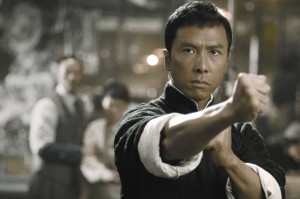Ip Man Movie Series Review – Yip Man Wing Chun

If you are a martial arts and Wing Chun enthusiast like me, you probably enjoyed the movies Ip Man (2008), Ip Man 2 (2010) and The Legend is Born – Ip Man (2010) a great deal. The next movie of the series, Ip Man 4 – Young Bruce Lee, is expected to be a martial arts cinema instant classic as well.
In Ip Man (2008) and Ip Man 2 (2010), Wilson Yip does a great job directing, Donnie Yen gives a solid acting performance as Yip Man, and Sammo Hung’s fight choreography is very well planned and executed. The latest movie, The Legend is Born – Ip Man (2010), was well directed by Herman Yau, and in it Dennis To aptly takes on the role of the young Yip Man.
All the Ip Man movies showcase interesting fight sequences that illustrate Wing Chun techniques and principles. Economy of movement, the principle of the short path, sticky hands application as well as deviation tactics are well presented.
But all entertainment purposes aside, there are some things you should know about the historical accuracy of the Ip Man movies.
First of all, credit must be given where where credit is due. Yip Man has gone down in history as one of the most important masters to ever represent and propagate the art of Wing Chun kung fu. So by the sheer size of his legacy, and the benefit it has done to the art, he deserves respect and recognition.
However, it is public domain that Yip Man’s life story was pretty different from the one portrayed in these semi-biographical movies. For instance, according to his biography, Ip Man : Portrait of a Kung Fu Master, written by his son Ip Ching and Ron Heimburger, Yip Man actually worked as a policeman, and for a long time only had informal students as he did not have an official school. Also, according to the film4.com movie review, Ip Man was never forced to work in a coal mine by the Japanese, and although he did refuse to teach the occupants his martial arts, he “certainly never had, let alone won, a duel with a Japanese general”.
During his life in Honk Kong, some people say that Yip Man’s original teaching business was poor, but nonetheless Ip Man is said to have had a pretty good reputation at the time due to his student’s sparring skills.
Today, Ip Man is credited with the near totality of Wing Chun practice across the world.
But it must be stated that not every Wing Chun kung fu school is of Yip Man descent. There are other less known branches of Wing Chun which come from a different lineage entirely. Our school, the Orthodox Wing Chun School of Vietnam is one of them, and we now have 7 locations in and around Montreal and Laval, and a new one just opened in Toronto.
The Orthodox branch differs from most Wing Chun kung fu schools mostly by its more extensive curriculum, including the 5 animal forms, high kicks, many different weapons forms, as well as many different tactics and strategies for hand to hand combat.
This is not to say that Yip Man’s Wing Chun is insufficient, since the style is known for keeping hand to hand combat to the bare essentials so it can be taught and mastered quickly and efficiently. But one might ask why Bruce Lee felt the need to create his own style of Jeet Kune Do despite his original formation in Wing Chun…
In any case, all martial arts have the potential of being great, and when looking for a school, the important thing is to find one that has a philosophy you can relate with, that is proficient in the art of combat (even if you are not looking to learn how to fight, it is an indication of a good school), in which the teacher has had a solid formation, and in which you feel at ease and you will be well taken care of as a student.
So in conclusion, although the Ip Man movies make for good entertainment, keep in mind that they are not, nor do they claim to be historically accurate, and regarding Yip Man’s art of Wing Chun kung fu, know that although his contribution to the style was great, his lineage of Wing Chun is not the only one still alive today.
For more information about Wing Chun kung fu lineage, click this link towards our Shaolin Wing Chun Kung Fu family tree : http://www.shaolinwingchun.com/en/origins/genealogy.
And if you want to learn more about the differences between Orthodox and Modern Wing Chun, click here for the article “The Unsung Wing Chun”: http://www.shaolinwingchun.com/en/library/news-articles/101-the-unsung-wing-chun.
Till next time, have an excellent day, and practice well.
Nam Kien

Bonjour, ceci est un commentaire.
Pour supprimer un commentaire, connectez-vous et affichez les commentaires de cet article. Vous pourrez alors les modifier ou les supprimer.